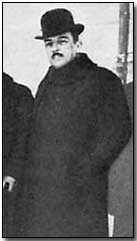Primary Documents - Richard von Kühlmann on the October Revolution, 30 November 1917
 Reproduced below is the
text of speech given to the German Reichstag by German Foreign Secretary
Richard von Kühlmann on 30 November 1917.
Reproduced below is the
text of speech given to the German Reichstag by German Foreign Secretary
Richard von Kühlmann on 30 November 1917.
In his speech Kühlmann applauded the onset of the Bolshevik October Revolution in the east and her desire "to find through an armistice and peace an opportunity for her internal reconstruction". Kühlmann commended this approach to Russia's allies in the west whom, he argued, were bent on military conquest of Germany at any price. Nevertheless, he stated, Germany would prevail.
Richard von Kühlmann on the October Revolution
Address to the Reichstag, 30 November 1917
Our eyes at the present moment are turned toward the east. Russia has set the world ablaze.
The gang of bureaucrats and sycophants, rotten to the core, overruling the weak and misguided though probably well-meaning autocrat, surreptitiously brought about the mobilization of that country, which was the actual and immediate cause of the gigantic catastrophe which befell the world.
Now, however, Russia has swept aside the culprits, and she is labouring to find through an armistice and peace an opportunity for her internal reconstruction. I need not supplement the clear words in which the Chancellor yesterday stated the attitude of the German Government toward these aims. Here again our policy will adhere to the principle of firm but moderate statesmanship based upon facts.
The principles hitherto announced to the world by the present rulers in Petrograd appear to be entirely acceptable as basis for reorganization of affairs in the east - a reorganization which, while fully taking into account the right of nations to determine their own destinies, is calculated permanently to safeguard the essential interests of the two great neighbouring nations, Germany and Russia.
I am profoundly satisfied that we shall be able to pursue this course in full agreement with our allies and, I take it, also with the almost unanimous moral support of the representatives of the German people here assembled - a fact which will give our action necessary weight.
In Germany the great words spoken by the Emperor at the outset of the war have during the war borne fruit, and have developed relations between the people and the Crown which have on the basis of the most sincere and mutual confidence forever more been rendered freer and more active, and, therefore, stronger.
In Germany the Government is carrying out the program laid down by the Chancellor yesterday, not giving way under party pressure, but rather proceeding with clear perception of historical necessity.
The development has been actually opposite that of England and France, where freedom of thought and freedom of speech have been suppressed, partly by violent and brutal measures. In these countries, which had been democracies, things are tending more and more toward absolute dictatorship.
If our adversaries are anxious to know what our aims are, this matter is very simple indeed. There is a sufficient number of ways at their disposal. History has not furnished a single example of any great diplomatic assembly purporting to settle international affairs ever having been convened without previously having informed itself as to the intentions of the parties concerned.
Germany welcomes the clearing of the situation as regards the western powers, under pressure of our recent successes.
Those in favour of war to the extreme have come out into the open, demanding victory and nothing but victory. How they intend to use this victory is shown by the secret documents published by the Russian Government.
Today it is certain that the Pope's message is receiving no response from the western powers, and that France and England are resolved to rely only on violence. Therefore the German people will stand up and be prepared to beat force with force until the dawn of the better and more humane understanding which is beginning to appear in the eastern sky shall arise in the nations of the west, which are as yet filled with greed for money and power.
Source: Source Records of the Great War, Vol. V, ed. Charles F. Horne, National Alumni 1923
A Flechette was an anti-personnel dart dropped from an aircraft.
- Did you know?
